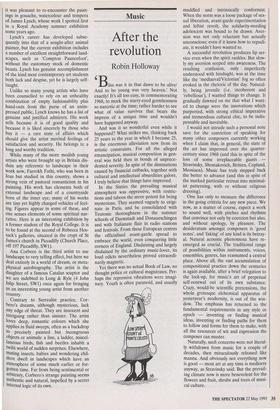Music
After the revolution
Robin Holloway
Bliss was it in that dawn to be alive/ And to be young was very heaven.' Not exactly! It's all too easy, in commemorating 1968, to mock the starry-eyed gormlessness so narcotic at the time; rather harder to see what of value survives that bears the impress of a unique time and wouldn't have happened anyway.
And was it so wonderful even while it happened? What strikes me, thinking back 25 years to the year in which I became 25, is the enormous alleviation now from its artistic constraints. For all the alleged emancipation, musical composition in gen- eral was held then in bonds of unprece- dented severity. In spite of the diminutions caused by financial cutbacks, together with cultural and intellectual absurdities galore, I truly believe that things have improved. In the Sixties the prevailing musical atmosphere was oppressive, with restric- tions and taboos the more potent for being mysterious. They seemed vaguely to origi- nate in Paris, and be consolidated with Teutonic thoroughness in the summer schools of Darmstadt and Donaueschingen and with Italianate flair in radio stations and festivals. From these European centres the officialised avant-garde spread to embrace the world, even conquering little corners of England. Disdaining and largely disdained by the ordinary music-lover, its loud edicts nevertheless proved extraordi- narily magnetic. Yet there was no actual Book of Law, no thought police or cultural magistrates. Per- haps the repressive vibrations were imagi- nary. Youth is often paranoid, and usually muddled and intrinsically conformist. When the norm was a loose package of sex- ual liberation, avant-garde experimentation and leftist revolt, the solidarity-needing adolescent was bound to be drawn. Aver- sion was not only reluctant but actually unconscious; even if it knew how to repudi- ate, it wouldn't have wanted to.
A successful revolution produces lip ser- vice even when the spirit rankles. But slow- ly my aversion seeped into awareness. The resulting confusion, only imperfectly understood with hindsight, was at the time like the 'mediaeval/Victorian' fog so often evoked in the rhetoric of the day. Natural- ly, being juvenile (i.e. incoherent and `rebellious'), I wanted things to change. It gradually dawned on me that what I want- ed to change were the innovations which purported, with strong ethical imperative and tremendous cultural chic, to be indis- pensable and inevitable.
I would not intrude such a personal note save for the conviction of speaking for many other composers currently working when I claim that, in general, the state of the art has improved over the quarter- century since 1968 (and this in spite of the loss of some irreplaceable giants Stravinsky, Shostakovich, Britten, Copland, Messiaen). Music has truly stepped back the better to advance (and this in spite of the marked particular retreat into minimal- ist patterning, with or without religious dressing).
One has only to measure the difference in the going criteria for any new piece. We now, as a matter of course, expect a work to sound well, with pitches and rhythms that convince not only by coercion but also, and without apology, by pleasure. The desideratum amongst composers is 'good notes', and 'faking' of any kind is its betray- al. Natural acoustic phenomena have re- emerged as crucial. The traditional range of possibilities within instruments, voices, ensembles, genres, has reassumed a central place. Above all, the vast accumulation of compositional practice down the centuries is again available, after a brief relegation to the lock-up, for music's art of perpetual self-renewal out of its own substance. Crazy, would-be scientific pretensions, the whole grotesque alchemical apparatus of yesteryear's modernity, is out of the win- dow. The emphasis has returned to the fundamental requirements in any style or epoch — inventing or finding musical ideas, inventing or finding paths for them to follow and forms for them to make, with all the resources of wit and expression the composer can muster.
Naturally, such concerns were not literal- ly withdrawn from music for a couple of decades, then miraculously released like manna. And obviously not everything now is good — most art at any time is mediocre anyway, as Stravinsky said. But the prevail- ing climate now is more benevolent for the flowers and fruit, shrubs and trees of musi- cal culture.


















































 Previous page
Previous page